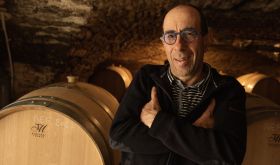The first meal I shared with Simon Maxwell, Director of the Overseas Development Institute, was dinner in the wood-panelled Hotel Schatzalp in Davos, Switzerland, during the World Economic Forum earlier this year.
Alice Waters and a team from Chez Panisse in Berkeley, California, were cooking a meal made exclusively of local Swiss ingredients for a roomful of guests that included Eric Schmidt from Google and the food writer Michael Pollan. Although he admitted to enjoying the Swiss bread, charcuterie, grilled lamb and Glocken apple galette, Maxwell could not hide his discomfort that only food grown locally was worthy of such a feast.
“What I would really like to do at Davos next year,” Maxwell explained as we parted, “is to organise a similarly high-profile dinner but using only ingredients that have been flown in from as far afield as the delegates. That, I believe, would highlight the links between consumers in the industrialised world and farmers in the developing world. This is a relationship that we have to encourage if we want to lift more people out of poverty and to raise overall food production.”
Maxwell, 60, speaks with authority and experience. Before he became Director of the ODI a decade ago, he had spent many years in the field working as an agricultural economist in Bolivia, India and the Sudan. Today, he is responsible for a staff of 130 at what he describes as the biggest think tank of its kind in the world devoted to international development and poverty reduction as well as global humanitarian and food policies. He describes the ODI as engaged in ‘policy entrepreneurship’, a role that in his opinion demands the skills of a storyteller, a networker, an engineer and a fixer.
I wanted to catch up with Maxwell again for several reasons. Firstly, over dinner he had spoken eloquently of his favourite lunchtime venue, the café in the Museum of Garden History next door to Lambeth Palace, the London residence of the Archbishop of Canterbury, which I had never visited. “It’s run by an Israeli who serves really good, fresh food,” he had enthused. Then there was the opportunity to hear firsthand Maxwell’s views on the current food crisis and to try to obtain some clarity on the issues that now cloud the consciences of so many professional and amateur chefs: how, when and where it is best to use seasonal produce and the carbon footprint impact of food sourcing.
No sooner had I walked into Maxwell’s office than I heard that the curse of the journalist had struck yet again. The only date I could secure in his crowded diary was a Monday, when his preferred café was closed. He proposed a chat in his office followed by a sandwich in another café, this time overlooking the Thames by Lambeth Bridge.
Our discussion initially reminded me of a university tutorial with Maxwell striding around pulling books off his shelf and cajoling his computer to print the ODI papers he kept referring to. Like any don, Maxwell kept drawing on historical precedents. “My first mentor in this field referred to the mention of manna from heaven in the Old Testament as the first incidence of food aid and in Food in History, Reay Tannahill’s excellent book, she relates how happy Julius Caesar was to hear that at one time he had managed to reduce the number dependent on the state’s grain handouts to 150,000. Food policy is nothing new, sadly.”
“What is new today is the extent of the shortfall, with world food stocks at their lowest level for 30 years. But it is encouraging to know that there is a wheat harvest somewhere in the world every 60 days and today’s higher prices will encourage more farmers to plant the cereals the world needs. This is vital because most small farmers who have to maximise the return from their land, which is their only asset, are currently finding that cash crops such as flowers or coffee will now provide them with a much higher return than the more traditional food crops.”
Maxwell has proposed a five-point plan for the task force set up by the UN but before elucidating that, he wanted to put the phrase ‘food crisis’ into perspective. “There are those who are comparing it with the credit crisis or the oil crisis but in many ways it is more complicated than both of these. We cannot pump more food out of the ground. Nor can we make millions of tons of food available overnight as the central banks have done to the banking system. We have to be more strategic.”
He would like, therefore, the UN to act to take the speculative bubble out of food prices, which, with an estimated cereal harvest of over two billion tons, should be possible. He would also like the UN to ensure immediate humanitarian needs are met, which even before the tragic events in Myanmar and China were estimated to cost over $755 million. To the specific challenges of higher food prices in developing countries and the prospect of export bans in countries keen to protect their own markets Maxwell has specific responses.
“I do believe that except in emergency situations like Darfur, food aid is the wrong first answer and I am much more in favour of those policies that are now being implemented across Africa and Asia where public sector wages are being increased to compensate for the rise in food prices and safety nets are being strengthened to protect the poorest from the effects of higher food prices. For example, in certain countries, like Egypt, bread is subsidised. In others, like Mexico, cash payments are being made for parents who send their children to school. As for the more emotive question of export bans, the instinctive reaction is to say that these are wrong and will only exacerbate the price spikes but I always ask my colleagues to put themselves in the position of the president of a developing, food exporting country, whose surpluses have disappeared onto the world market and where prices are rising fast. He, or she, is in their palace and they can hear the rioting outside and smell the gas from the police canisters as they try to quell the riots in the streets. What would they do in this position? I think we need a deal. Countries resist export bans. We commit to helping with the cost of the safety nets. In addition, the world needs better information on stocks and trade. Maybe too, a one-year moratorium on the use of maize for biofuel which could cut prices by more than 20% immediately.”
His final demand is that we must shake off the complacency that resulted from years of higher yields and lower prices and reinvest in research, irrigation and infrastructure. “Twenty years ago we used to have a food policy, then we switched to concentrating on food security but now we all need a coherent food policy.” It was only at this point in our conversation that it was possible to detect a note of despondency in Maxwell’s voice. Although he had initially described the whole ambit of his institute as ‘a wonderful area to be working on’ there was an obvious sense of frustration on his part at the slow progress in finding and delivering the solutions that can ultimately overcome the challenge of feeding the world.
Over a grilled Parma ham, avocado and mozzarella ciabatta, Maxwell turned to the role of the supermarkets in the food chain. He could not hide his enthusiasm. “I think that on the whole the industrialisation of the food supply has driven prices down, reduced waste and improved quality in the supply chain. Whenever I have taken food policy specialists from developing countries to see how supermarkets work, they have always left impressed and I think that if we are to find a solution to the current food crisis then we turn our back on technology at our peril. The food system needs to industrialise further to cope with growing urbanisation. There will be 200 million more people living in towns in India by 2020, for example, with up to 70 cities of more than a million people. In Africa the same is true: in West Africa alone, an extra 200 million urban people by 2020, with at least 30 cities of more than a million. The questions now are how do we manage this and who is accountable? Whenever farmers in the developing world have been able to come together to supply specific produce for the larger customers there has invariably been an improvement in their return. We need this to happen more frequently.”
On the issue of carbon emissions, Maxwell contends, citing research by the UK’s Development for Food and Rural Affairs, that we as consumers expend more travelling to and from the supermarket than that used to fly the produce around the world. In Kenya alone, he continued, more than a million jobs depend on exporting fresh produce to the UK.
Maxwell’s response to my enthusiasm for farmers’ markets was more muted. While he questioned some of the assumptions many claim for them, most notably whether their produce is always fresher and therefore healthier, he recognises their value. “I think British farmers have to respond in the way so many British manufacturers have done to the competition from China and find their particular high-value niche. But the overall volumes are small and we have grown far too dependent on produce that cannot be grown in the UK. Continuing to buy from the developing world will only benefit those who need it most.”
As we walked back to his office, Maxwell decided to stop for dessert at a fruit stall on Lower Marsh, a characterful street just behind Waterloo Station. For fifty pence I bought two crisp red Royal Gala apples on offer long before the British apple harvest. They were from Brazil, a fact not lost on Maxwell.












